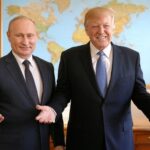Energy News Beat
I have been discussing this for months on the Energy News Beat Podcast, and the secondary sanctions on China and India’s refineries would undoubtedly cause havoc in the global and U.S. markets. The U.S. Dollar is the prize, and President Trump knows this. What he does not understand is that President Putin has survived all the sanctions by moving oil, natural gas, and LNG, thereby bypassing the U.S. Dollar and creating systems where President Putin is unconcerned with what President Trump thinks. His advisors on the war thought they were negotiating from a position of strength, but they were late. President Putin has already pushed the new trading blocs east, into the Middle East, and on to Asia, and those new trading blocs have the potential to leave the EU, UK, and Canada in the dust.
Irina Slav has always been right on sanctions. “Sanctions do not work as intended.” And she is spot on.
Why Hasn’t Trump Hit Russia with More Sanctions?
As the Russia-Ukraine conflict continues to dominate global headlines, one question looms large: why hasn’t U.S. President Donald Trump imposed harsher sanctions on Russia? Despite escalating Russian aggression, including intensified aerial attacks on Ukrainian cities, Trump’s administration has been notably restrained in leveraging economic penalties against Moscow. This hesitation has sparked debate among policymakers, analysts, and energy markets, given Russia’s reliance on oil and gas exports to fund its war machine. Drawing on recent developments, this article explores the reasons behind Trump’s reluctance and the potential implications for global energy dynamics.
A Push for Peace Talks Over Punitive Measures
At the heart of Trump’s approach is his stated desire to broker a ceasefire and peace deal in Ukraine. Reports indicate that the president is wary of imposing new sanctions, fearing they could derail delicate negotiations with Russian President Vladimir Putin. Trump has repeatedly emphasized that sanctions might harden Putin’s stance, undermining efforts to bring Russia to the negotiating table. For instance, in a May 2025 statement, Trump explained, “If I think I’m close to getting a deal, I don’t want to screw it up by doing that,” referring to potential sanctions.
This strategy reflects Trump’s belief that maintaining open lines of communication with Putin is critical. His administration has pursued diplomatic channels, including direct talks and a special envoy, to push for a memorandum of peace. However, critics argue that this approach has yielded little progress, with Putin continuing to demand terms that amount to a Ukrainian surrender. The absence of a promised Russian peace proposal following a May 2025 call between Trump and Putin has only fueled frustration, prompting Trump to publicly call Putin “absolutely CRAZY” and hint at sanctions without following through.
Economic and Energy Considerations
Russia’s economy, heavily dependent on oil and gas revenues, is vulnerable to sanctions, particularly those targeting its energy sector. Western sanctions, including an oil price cap, have already shaved an estimated $142 billion off Russia’s economy since 2022, according to the Kyiv School of Economics. Yet, Trump’s reluctance to tighten the screws may stem from concerns about global energy markets and domestic economic priorities.
Lowering the G7’s oil price cap from $60 to $50 per barrel, as proposed in early 2025, could further strain Russia’s finances, especially as its economy faces slowing growth and high interest rates. However, Trump blocked this move, possibly to avoid benefiting competitors like China and India, who purchase discounted Russian oil. Additionally, targeting Russia’s “shadow fleet”—a network of aging tankers used to evade sanctions—could disrupt Moscow’s oil exports but risks spiking global energy prices, a politically sensitive issue for Trump’s administration.
Sanctions also carry risks for the U.S. dollar’s dominance in global trade. Secondary sanctions, which penalize foreign entities doing business with Russia, could alienate allies or push countries like China to accelerate de-dollarization efforts. Rachel Ziemba, an analyst cited in recent reports, noted that such measures might be softened in Congress to mitigate blowback from Trump’s broader tariff policies.
Domestic and Congressional Dynamics
Despite bipartisan support for tougher sanctions, Trump’s hesitation reflects a complex interplay of domestic politics and personal leadership style. A bipartisan bill, the Sanctioning Russia Act of 2025, spearheaded by Senators Lindsey Graham and Richard Blumenthal, has garnered over 80 Senate co-sponsors. The bill proposes primary sanctions on Russian banks and secondary sanctions on entities supporting Moscow’s war efforts, including a potential 500% tariff on countries buying Russian oil.
However, Trump has not endorsed the bill, and his administration has signaled skepticism about sanctions’ effectiveness. White House Press Secretary Karoline Leavitt has deflected questions about the legislation, reiterating Trump’s focus on a “negotiated peace deal” while keeping “all options on the table.” Some advisors argue that sanctions could hurt U.S. companies or drive Russia away from talks, a view Trump has echoed privately. Without Trump’s explicit support, House Republicans are wary of advancing the bill, fearing a clash with the president.
A Pattern of Threats Without Action
Trump’s rhetoric has often been fiery, with warnings of “devastating” measures against Russia if Putin fails to engage in peace talks. In March 2025, he threatened “large-scale banking sanctions” and tariffs, only to later defend Putin’s actions as something “anybody else would do.” This pattern of threats followed by inaction has led critics to question whether Trump’s stance signals a genuine shift toward aggression or merely posturing to appease domestic and international pressure.
Some speculate that Trump’s past affinity for Putin and his reluctance to disrupt potential business opportunities with Moscow play a role. Posts on X and reports from outlets like The New York Times have suggested that Trump views sanctions as a barrier to future U.S.-Russia economic ties, though these claims remain inconclusive. Others, like former U.S. envoy Kurt Volker, argue that Trump’s patience is wearing thin, and new sanctions could be imminent if Putin continues to stall.
Implications for Energy Markets and Beyond
The absence of new sanctions has significant implications for global energy markets. Russia’s ability to circumvent existing measures through its shadow fleet and trade with countries like India and China has kept its war machine funded. Tightening sanctions on these channels could deliver a “tangible blow” to Putin, as noted by analyst Leon Aron, but it requires political will that Trump has yet to demonstrate.
For Ukraine, the lack of U.S. sanctions compounds the challenges of resisting Russian advances, especially as Trump has paused military aid and intelligence sharing. European allies, frustrated by Trump’s inaction, have imposed their own sanctions, but they lack the economic clout of U.S. measures. This dynamic underscores the pivotal role of U.S. leadership in shaping the conflict’s trajectory.
Conclusion
President Trump’s reluctance to hit Russia with more sanctions stems from a mix of diplomatic ambitions, economic caution, and domestic political calculations. While his focus on peace talks reflects a desire to end the Russia-Ukraine war, critics argue that his approach has emboldened Putin, allowing Russia to sustain its aggression. As bipartisan pressure mounts and Russia’s economy shows signs of strain, the question remains whether Trump will shift gears and wield sanctions as a tool to force Moscow’s hand—or continue to prioritize diplomacy over confrontation. For energy markets and global geopolitics, the stakes could not be higher.
If the war mongers in Congress stand up and force sanctions on Putin, they will only be ineffective sanctions, as they would not have the collective balls to sanction China and India. The EU, the UK, and the United States’ weaponization of the U.S. dollar through sanctions created the dark fleet and new trading blocs. That actually did more harm to the Bank of England and the U.S. dollar than it hurt President Putin.
At one time, we could have ended the war and maintained a business relationship with Russia, and I am unsure if that opportunity has passed. Only time will tell, and we just need an end to the war, corruption, and alleged kickbacks to the U.S. Congress. I hope that our current DOJ will ferret out the political leaders who took taxpayer money from Ukraine. But I am not holding my breath.
George McMillon on my podcast has been correct all along. Now, “All Putin has to do is nothing” is more accurate than when he said that on the podcast. You can find all of the George McMillan articles here: https://energynewsbeat.co/george-mcmillian/
Disclaimer: This article reflects information available as of June 1, 2025, and is subject to change as new developments emerge.
The post Why Hasn’t Trump Hit Russia with More Sanctions? – Because it would hand the Mid-term elections to the Democrats appeared first on Energy News Beat.









